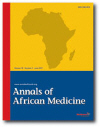
|
Annals of African Medicine
Annals of African Medicine Society
ISSN: 1596-3519
Vol. 9, No. 4, 2010, pp. 218-221
|
 Bioline Code: am10050
Bioline Code: am10050
Full paper language: English
Document type: Research Article
Document available free of charge
|
|
|
Annals of African Medicine, Vol. 9, No. 4, 2010, pp. 218-221
| en |
Otology practice in a Nigerian tertiary health institution: A 10-year review
Salisu, A.D.
Abstract
Background : The practice of otology in developing countries has remained unsatisfactory. The aim of this study is to describe the practice in a tertiary health institution with a view to articulate strategies for improvement.
Materials and Method : This a retrospective study of patients with otology problems, who attended Ear, Nose and Throat clinic of Aminu Kano Teaching Hospital, Kano, over a 10-year period (1997-2007). Case notes were retrieved and studied.
Results : Otologic conditions accounted for 56.3% of the 8070 clinic visits. The most frequent condition seen was chronic otitis media (25.4%). Sensorineural hearing loss (mostly preventable) accounted for 16%. Other cases included wax impaction (7.5%) and foreign body in ear (7.3%). Modern diagnostic and operative equipment were lacking. Operative surgery was offered to 4% of cases of chronic suppurative otitis media and 72% of patients needing hearing aid could not afford one. There was no middle ear reconstructive or inner ear operation in the 10-year period.
Conclusion : A significant number of patients are in need of otology services. These services are inadequate presently. Concerted effort should be geared toward strengthening preventive ear health, training and re-training, procurement of relevant diagnostic and operative equipment.
Keywords
Developing countries, Otology practice
|
| |
| fr |
Salisu, A.D.
Résumé
Arrière-plan: La pratique du otologie dans les pays en développement est resté insatisfaisante. L’objectif de cette étude est de décrire la pratique dans un établissement de santé tertiaires en vue de stratégies articulées pour amélioration.
Matériaux et de la méthode: Cette étude une rétrospective des patients souffrant de problèmes d’otologie, qui ont participé aux oreilles, nez et gorge clinique de Aminu Kano enseignement Hospital, Kano, sur une période de 10 ans (1997–2007). Notes de cas ont été récupérés et étudiés.
Résultats: Otologic conditions représentaient 56.3% des visites 8070 clinique. La condition plus fréquente vue était otite chronique (25,4%). Une perte auditive neurosensorielle (principalement évitable) représentait 16%. Autres cas inclus cire impaction (7,5%) et un corps étranger dans l’oreille (7,3%). Équipement moderne de diagnostic et dispositif manquaient. Chirurgie du dispositif a été offerte à 4% des cas de chronique suppurative otite et 72% des patients qui ont besoin de la prothèse auditive ne pouvaient se permettre un. Il n’y n’avait aucune oreille moyenne reconstructive ou l’oreille interne opération pendant l’année de 10 période.
Conclusion: Un important nombre de patients ont besoin de services d’otologie. Ces services sont actuellement insuffisants. Effort concerté doit être orienté vers le renforcement de santé préventive d’oreille, de formation et de recyclage, approvisionnement de pertinentes diagnostic et dispositif matériel.
Mots Clés
Pays en développement, pratique otologie
|
| |
© Copyright 2010 Annals of African Medicine.
Alternative site location: http://www.annalsafrmed.org
|
|
